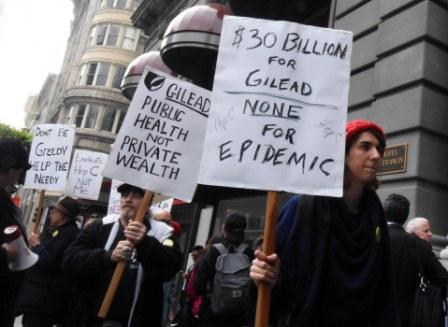On Monday January 11, hepatitis C advocates from the O.A.S.I.S. Clinic and a coalition of other community activists rallied at the 34th annual J.P. Morgan Healthcare Conference at the Westin Saint Francis Hotel in San Francisco to protest Gilead’s exorbitant price for their hepatitis C drugs. Here is their manifesto:
Our coalition of community activists is conducting this action to highlight the devastating impact of excessive pharmaceutical pricing. We specifically bring attention to Gilead Sciences, Inc. which was found by a recent Senate Finance Committee investigation to have “pursued a calculated scheme for pricing and marketing its hepatitis C drug based on one goal: maximizing revenue regardless of the human consequences.”
We recognize that biotechnology holds promise for an exciting wave of novel treatments for many medical conditions, and that the lure of profits encourages investors to support these often risky efforts. We also gratefully acknowledge Gilead’s role in developing Sovaldi and Harvoni, which have finally made it possible to save more lives and end the hepatitis C epidemic, and we agree that reasonable profits are in order. But Gilead’s pricing has stepped over the line to profiteering and is undercutting the fabric of our healthcare system.
The hepatitis C virus affects about 3 million persons in the U.S. With a 12-week course of Gilead’s Harvoni priced at nearly $100,000, taxpayer-funded Medicare Part D spent $4.6 billion on hepatitis C alone in the first half of 2015, leaving seniors and disabled persons with the prospect of higher deductibles and maximum out-of-pocket costs. Twenty-nine states said that hepatitis C was their most or second most costly pharmaceutical outlay, resulting in only 2.4% of affected Medicaid enrollees undergoing treatment.
We now have the tools to eliminate the hepatitis C epidemic, which is primarily spread by unsafe injection and sexual practices. Drug users, incarcerated individuals, and the homeless are at high risk for transmission, but a public health strategy to focus on these individuals is impossible because it is simply too expensive. And so the epidemic proceeds apace.
When insurers refuse to pay for treatment, all but the wealthy are left at risk for cirrhosis, liver cancer, and death. While anticipating record profits of $30 billion in 2015, Gilead virtually eliminated its medication assistance program for all but the few Americans ineligible for coverage under the Affordable Care Act. The reason? They felt that insurers were taking advantage of their generosity. Gilead justifies its pricing because its Harvoni treatment is, indeed, a game changer: over 90% of hepatitis C patients can achieve a cure with as little as one pill a day. But to realistically address this epidemic at current pricing levels would bankrupt our healthcare system. Gilead’s argument that insurers need to pay up ignores this reality: insurers don’t print money. With a condition this common and this costly, we’d need to raise taxes, insurance premiums and deductibles. Most peoples’ budgets are already spread too thin.
The Gilead paradigm of maximizing profits with utter disregard for patient outcomes will lead to intrusive government oversight and regulation that will squelch innovation. Pharma needs to voluntarily seek a better balance between responsible pricing and patient access. Biotechnology holds great promise for the future of our healthcare system, but not if none of us can afford it.
Photo Credit: Bill Hackwell



2 Comments
2 Comments